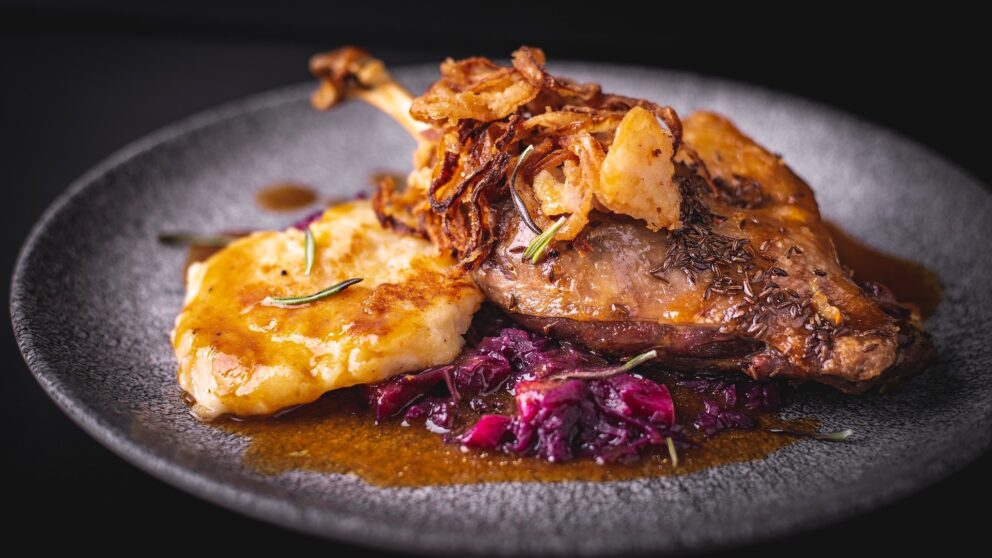
Six great products that are quintessentially Düsseldorf
Six great products that are quintessentially Düsseldorf
Düsseldorf to go
In Düsseldorf, home-brewed top-fermented beer, the so-called Altbier, flows from the taps - this is known worldwide. However, we would like to let you know that there are also oil and gin springs that bubble eagerly, that local manufacturers produce soaps and pomade, and that you can smear the Düsseldorf lifestyle not only as "Schmör" in your hair, but also in the form of honey on your bread or as mustard on your sausage. The following six products are very Düsseldorf for a variety of reasons.
Sustainable down to the last drop: The oils of the Düsseldorf Oil Manufactory
Did you know? The people of Düsseldorf have their own oil well! It is located in Derendorf, more precisely in a backyard on Spichernstraße. Although the oil doesn't gush out of the ground there, it does flow steadily from the oil press. The oil factory located here presses fresh, natural products every day, including high-quality basic oils from sunflowers or rapeseed, fine gourmet varieties such as hazelnut, apricot kernel and poppy seed oil, trendy oils from hemp and special varieties such as linseed and black cumin oil. Only kernels and seeds from controlled organic cultivation go into the press at the manufactory. In addition, the company has committed itself to gentle "slow production" - in keeping with the slow food concept. To get the best out of the high-quality organic seeds, the experts around founder Michael Karlos work with a slowly rotating screw press. The oil is extracted exclusively by mechanical pressure, and then - this is also special - carefully filtered by hand. You should definitely try the organic apricot kernel oil. It smells of marzipan and almonds and refines not only desserts, muesli and pancakes, but also salad dressings. Heavenly!
Great grease: Kappesschmör
You can almost guess: when it comes to pomade, opinions differ. As with all products that come into contact with skin and hair, hair grease also has fans who swear by a particular product with almost religious conviction. And in Düsseldorf, that's usually: "Kappesschmör." Only a handful of German barbershops live and love the cult of neat men's hairstyles as much as André Lichtenscheidt and his team from the "Cut Corner" barbershop. The retro barber has been serving the rockabilly scene for many decades. The desire to create their very own pomade for them came true with the support of the pomade manufacturer "Fettkopp". Now a scent of citrus, ginger and sandalwood wafts through the salon when Lichtenscheidt and her colleagues lift the can lids. With eager hand rubbing, the hair grease becomes warm and soft and can then be distributed wonderfully. And: The quiff stands like a one! Once hooked, you don't want anything else, claim the disciples of "Kappesschmör". Fortunately, there are also supplies online.
Fun in a glass: Yoshi Nama Little Tokyo Dry Gin
A German gin with a Japanese spirit can really only come from Düsseldorf. After all, this is where Germany's largest Japanese community is located. The district is called Little Tokyo, and that's the name of the dry gin from Yoshi Nama. The Japanese part of the gin is the distillation method used by the experts from "Faude feine Brände" in the house distillery in Kaiserstuhl. The German ingredients are provided by botanicals selected by the spiritual father of the gin, Maximilian Bergfried from Düsseldorf. Juniper, gentian, sloe and cranberry play the leading roles and meet the ambassadors of tart freshness: the peels of fresh lemon and grapefruit. The crowning glory is saffron, which tickles the palate with its spicy finish. By the way, it's not just the taste that's convincing about "Yoshi Nama Little Tokyo Dry Gin". The funny label shows a hard-drinking panda in a kimono in front of a basket with the ingredients, which promises lots of fun in the glass. An ideal souvenir!
Hot in a pot: ABB mustard
A little more mustard? They don't say no to that in Düsseldorf! Some of the hearty Rhenish brewhouse dishes just go with it. The "Halve Hahn," as the rye roll with cheese and sour pickle is called here, for example, feels extremely uncomfortable without Mostert. The oldest product and known under the name "ABB" as the "aechte Düsseldorfer Mostert" comes to the table in a gray stoneware mustard pot. This pungent, malty mustard is made from brown and yellow mustard seeds, in a production method that has remained virtually unchanged since 1726: A 500 kg granite millstone is still used for grinding. The company also relies on tradition for its packaging. The initials of company founder Adam Bernhard Bergrath and a blue anchor are still painted by hand on the jar. Fun fact for art lovers: Vincent van Gogh already depicted a gray ABB mustard pot in his painting "Still Life with Bottles and Ceramics", which he created at the end of 1884. You can admire the painting in the Van Gogh Museum in Amsterdam, but the original mustard is only available in Düsseldorf.
Düsseldorf flower dreams: The city honey
City and honey? Isn't that a paradox? Not in Düsseldorf, which is zoologically more diverse than almost any other major German city. As a result, even the individual city districts know their own characteristic flower honey. For the scientists among you: Blossom honey is the general varietal designation for a honey that does not predominantly come from a single bee-breeding plant. In Düsseldorf-Itter, for example, a honey from the tracht of acacia, fruit blossom and rape is a particularly typical product. This blossom honey has a light yellow, almost white color and is creamy. In the district of Hamm, on the other hand, the honey comes from the tracht of lime and acacia and the dandelion, which is more abundant there, has a golden yellow color and remains liquid longer. In Stockum, fruit blossoms, honeydew and wild herbs determine the appearance and taste of the blossom honey. This shines dark yellow in the jar and also has a liquid consistency. Are you in a hurry to decide? Take two. Honey is virtually non-perishable.
Clean things: The Natalie Soap Manufacture
Creams, bath additives and especially soaps, that's what Natalie Czekaj has been passionate about for almost a decade. In 2018, she decided to share her passion and founded her family-run manufactory for individual hand-boiled soaps. The rest is gently lathering history. Not only that the own assortment is constantly growing. Natalie's soap manufactory offers companies to develop their own recipes and designs for them. Because the advantages of homemade solid soaps cannot be denied: for example, in terms of care and refatting. At least eight percent of the oils and fats used are not saponified and thus serve as natural refatting agents. In addition, solid soap has a natural glycerin content that provides the skin with optimum moisture. In addition, it is much more economical than liquid soap, as it cannot be overdosed, so it is not only gentle on sensitive skin, but also on the wallet. Bacteria and germs avoid solid soaps because of their alkaline surface, and there's no need for a plastic bottle as packaging either. Another argument in favor? Natalie's soaps are all beautifully designed and each bar is unique. That is completely convincing.
Title image: Düsseldorf Tourism




